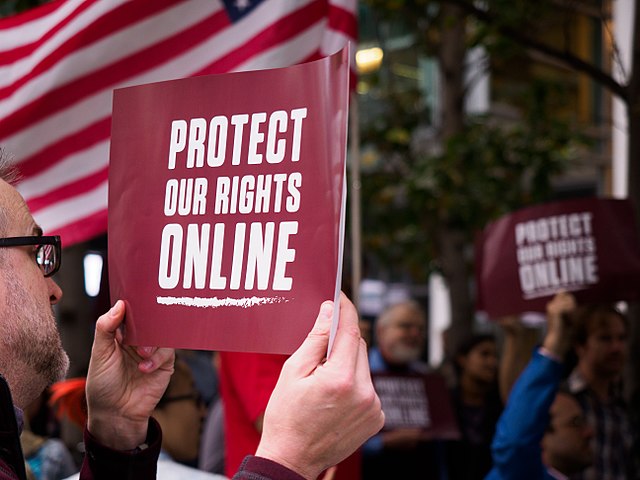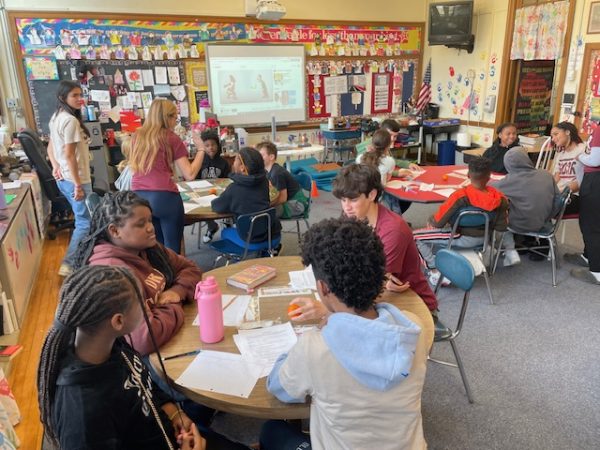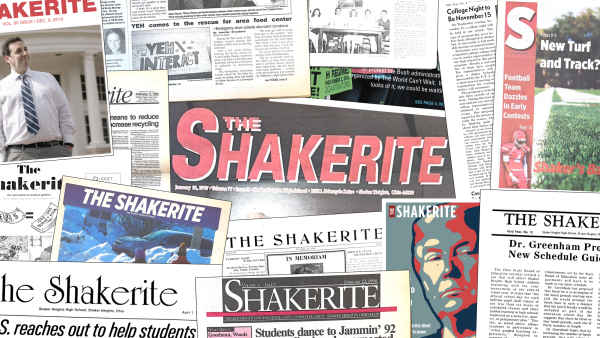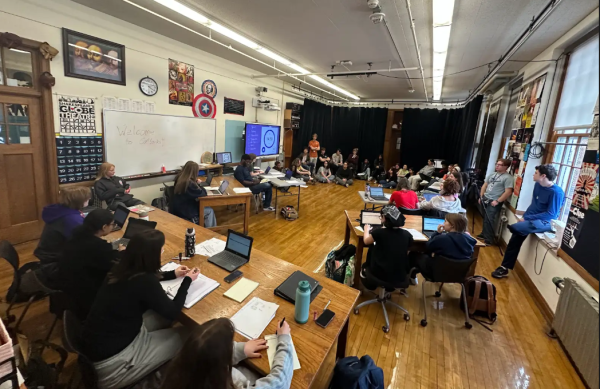Goodbye, Free Internet
Faculty and students react to the truth about the net neutrality repeal
A protester holds a “Protect our rights online” sign at a rally in San Francisco, CA to protest the deregulation of the internet. “The FCC’s argument for the repeal was basically that regulations would hurt investments in broadband infrastructure,” said Gulani. “That’s also just false because broadband providers actually increased their investments when the regulation was put in place in 2015.”
The Federal Communications Commission voted 3-2 in December 2017 to remove regulations that treated the internet as a public utility rather than a competitive market.
Net neutrality is the idea that everything on the Internet is equal. If the Internet is a highway, everyone on the Internet is a car going at the same speed. The cars can go wherever they want no matter who they are.
Now that net neutrality has been successfully repealed, internet users will experience service differently. On the highway, there is a fast lane and a slow lane. Companies and consumers that pay Internet service providers can go in the fast lane for quicker access, and those who do not pay will have slower and more limited access.
Ajit Pai is the chairman of the Federal Communications Commission and former lawyer for Verizon. Pai justified his repeal and stated in his statement on the repeal, “The government shouldn’t be in the business of picking winners and losers in the Internet economy. We should have a level playing field and let consumers decide who prevails.” Opponents of the repeal say that the vote was biased because of Pai’s background.
Senior Maya Gulani, an activist for net neutrality, said the reason for the repeal was not warranted. Gulani made an informational poster to help the fight for net neutrality. Gulani said she has advocated for net neutrality prior to the stricter net neutrality regulations put in place by the Obama administration.
“The FCC’s argument for the repeal was basically that regulations would hurt investments in broadband infrastructure,” said Gulani. “That’s also just false because broadband providers actually increased their investments when the regulation was put in place in 2015.”
Edward Horowitz is an associate professor of communications at Cleveland State University, specializing in communications, mass media effect and political communications. “Net neutrality means that information that you get on the internet is delivered to your house in the same way as your utilities are delivered,” said Horowitz.
He explained that net neutrality treats the internet like a water company treats consumers. Water companies require everyone to pay the same rate. Net neutrality works the same. “All that information, no matter who it was coming from, would be carried to you in the same pathway and there would be no preferential treatment for any of that content,” he said.
Horowitz said that Internet service providers are adverse to net neutrality is because they feel they have the right to be treated as capitalist businesses of the market rather than public utilities like a water company. The opposing side says that in a democratic country, we should have access to all information without having to pay more money.
Without net neutrality, these Internet service providers can discriminate against companies by making their data slower. “If Bing paid Verizon more money,” said Gulani, then Verizon could favor Bing with data fees and speed, “and thus render Google a less useful resource.”
Gulani said that less-prioritized companies could be as functioning as others if consumers paid their Internet service provider fees. For example, an Internet service provider might require a customer to pay them a fee of $10 in order to use Gmail.
Gulani said that the scariest part of the repeal was the censorship that would come from it. “Net neutrality ensures that the ISPs can’t strangle certain websites over others. That would affect search engines, but also news sources,” she said.
“For example, if the New York Times published a piece that heavily criticized an ISP, then that ISP could go and strangle their website so that it takes so long to load that it is unusable. Or, they could even just strangle a specific article and try to pass it off like they are not doing anything. They can essentially censor what news reaches the people online.”
The Federal Communications Commission’s vote was unpopular among Americans. According to a poll conducted by the University of Maryland’s Program for Public Consultation, 83% of voters support net neutrality.
Senior Emma Neil is in support of net neutrality. “I’m really scared and concerned and upset for the future,” she said. “The Internet is no longer a free thing — the Internet is no longer equal. It’s also scary for small businesses because, how will you get someone to look at your website if they have to pay extra.”
“Most people think of this in terms of entertainment or news,” Horowitz said, but education is raising questions as well. Public schools might have to pay more to be in the “express lane” of the Internet, which could be a threat to all the work done online in schools.
Robin Sweigert, high school librarian, thinks that the repeal leads to a scary future. “I think it could potentially lead to the Internet providers price-gouging. They can jack it up because they know we need it.” Sweigert believes that though this will pose a challenge for schools, they have few alternatives. “I think that schools will end up bowing to the big companies and paying what it takes, at least I think that Shaker would, so that you guys have access to what you need.”
Gulani said that the repeal is just the first step. “First, it’s going to take a long time for the repeal to be put in place. New laws have to be created, and that’s going to take time. In essence, we are looking at the future.
“They’re not going to all of the sudden start charging you money to use Snapchat or Instagram. It’s going to be slow, gradual change,” Gulani said. “They’re going to slowly start charging websites more to have higher data fees. They’re going to make these changes as discreet and as gradual as possible so that they look good publicly, and that’s really important to keep in mind.”
Comment using your Facebook, Yahoo, AOL or Hotmail account










